ADSactly Literature: Benchmark Theater - Look Back in Anger
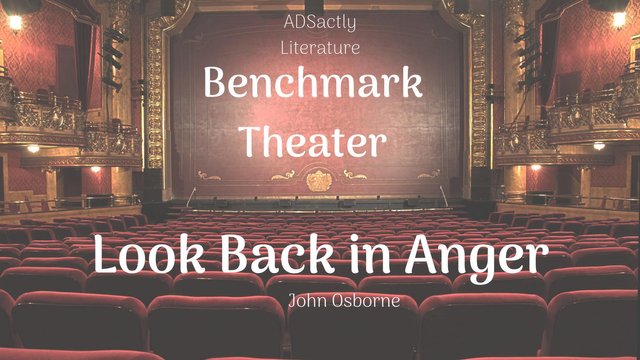
We’ve talked, in the past, quite a lot about literature. We’ve discussed character archetypes, basic story plots, as well as famous literary figures such as JK Rowling and Ernest Hemingway. And looking back at all the topics we’ve covered, I realize, with dismay, that there is one field of writing, a field that is very dear to me, which we’ve ignored almost completely. I’m talking, of course, about theater. While we have talked a little about William Shakespeare’s plays, we haven’t really explored much else and it seems a shame… There is such an incredible, vast array of plays and theater writings out there. And I think it’s time we delve into that world.
And first up on our list of great plays is the 1956 classic ‘Look Back in Anger’ by British playwright John Osborne. Although the play was originally written to give voice to a generation of disgruntled young men, many of its themes resonate with out world today. Sure, the exact problems have changed, our world is very different than that of young Jimmy Porter (the play’s main character), but there is just something about human mentality, especially what it means to be young, that Osborne managed to capture.
‘Look Back in Anger’ was the first play to explore the theme of the “angry young man” (a theme later touched upon by Harold Pinter and Kingsley Amis), which basically referred to the generation of working class young men and artists in the post World War II era, who generally shared leftist, often even anarchist political views.
Take, if you will, the play’s main character, Jimmy Porter. Jimmy’s main issue is that he is over-educated and under-employed. He feels alienated in this modern world and feels convinced that he’s living in an Americanized Britain that has left men like him behind. He is a highly intelligent man, yet his only employment is selling sweets at a street stall with his friend Cliff, which makes him resentful and angry. He frequently takes out this anger on his middle-class wife, Alison.
"One day, when I'm not longer spending my days running a sweet-stall, I may write a book about us all. ...It'll be recollected in fire, and blood. My blood."
Cliff often tries to act as mediator between the two, but more often than not, gets caught in Jimmy’s tirades against his quiet wife, whom he blames for everything (from her family’s social status to his own misery).
It’s a profoundly strange relationship, if you think about it. Despite Jimmy’s abuse, Alison remains loyal to him and confides in Cliff that she is pregnant with Jimmy’s child. But before she can tell Jimmy, she receives news her good friend Helena is coming for a visit and Jimmy flies into a rage. He curses Alison and wishes she would know real suffering,
"If you could have a child, and it would die...if only I could watch you face that."
He tells her, unwittingly foreshadowing future events later in the play.
Helena arrives and arranges for Alison’s father, the Colonel, to come and take his daughter home, rescue her from Jimmy, which he does. However, Helena stays behind and begins a romantic affair with Jimmy herself (also becoming the target of his abuse). In the third and final act, Alison returns, looking like a ghost, and tells Helena she has, indeed, lost the baby she was carrying.
The two reconcile and Helena leaves, ashamed of her own behavior and the play ends with Jimmy getting back with Alison in a sort of truce.
‘Look Back in Anger’ is a key example of the realist movement known as “kitchen sink drama”, which basically referred to plays exploring the domestic lives of working class couples, dealing with all sorts of gritty subjects, such as cheating, abortion and even homelessness. It was a different view of the theater altogether and ‘Look Back in Anger’ was considered, by many, revolutionary.
According to Osborne himself, his play was crucially different to British theater at that time because it relied on more “real” feelings. It was Osborne’s belief that up until that point, most plays featured subdued, dull emotions, whereas his focused on raw anger, making it more true to life (a key sentiment for Jimmy Porter, this desire to live a “real life” and escape the monotony of day to day existence).
"Jimmy went into battle with his axe swinging round his head -- frail, and so full of fire. I had never seen anything like it. The old story of the knight in shining armour (sic) -- except that his armour didn't really shine very much."
Another big theme in ‘Look Back in Anger’ is the loss of childhood. This is evident both in Jimmy and Alison. Jimmy’s father died when he was just a ten year old boy, and so, he was exposed to the harsh realities of life at an early age. Alison’s loss of childhood, in turn, happens when she marries Jimmy, in a small act of defiance against her middle-class upbringing.
This loss of life was also evident in the post WWII world. In that case, obviously, the loss of childhood happens because of the World War. Osborne believed that his generation had failed to maintain that sense of innocence that other generations before him had possessed.
Anger, resentment and a loss of childhood – feelings that are so painfully easy to relate to, even today. If Osborne could talk about the loss of innocence in the 50s, what can we say today? Perhaps I’m biased, as I’ve always enjoyed this play, but I honestly think ‘Look Back in Anger’ is just as relevant today as it was 60 years ago.
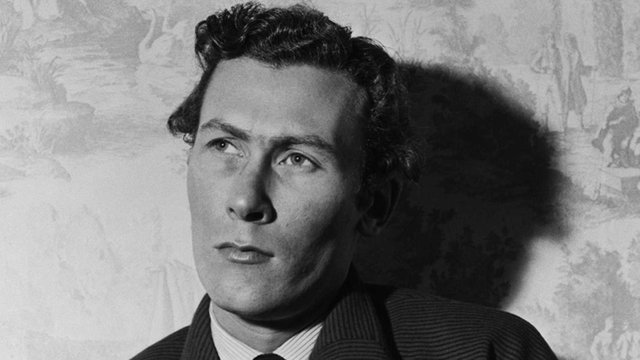
A young John Osborne source
Interestingly, the play was written in only 17 days on Morecambe Pier and it’s hugely autobiographical. At the time, 26-year-old Osborne was going through a bitter divorce with actress Pamela Lane, who was having an affair with a local dentist and never really believed in Osborne’ dreams or supported him. While a fascinating play in itself, it’s also an interesting window into John Osborne’s mind.
As far as I know, the play is still being produced in theaters around the world, and maybe this post has awoken your interest. Maybe you go out and see it. But if that is not available to you, I highly recommend the 1959 movie version starring an impossibly young Richard Burton (also starring Mary Ure as Alison. After the London production of the play, Ure married the newly-divorced Osborne). In my humble opinion, there can’t be another Jimmy Porter aside from Burton, so give that a look.
Authored by @honeydue
References 1 2 3 4
Original Thumbnail Picture
Click on the coin to join our Discord Chat

Witness proposal is here:
Go To Steem Witness Page
In the bottom of the page type: adsactly-witness and press vote.

Use small letters and no "@" sign. Or, click here to vote directly!
Thank you!
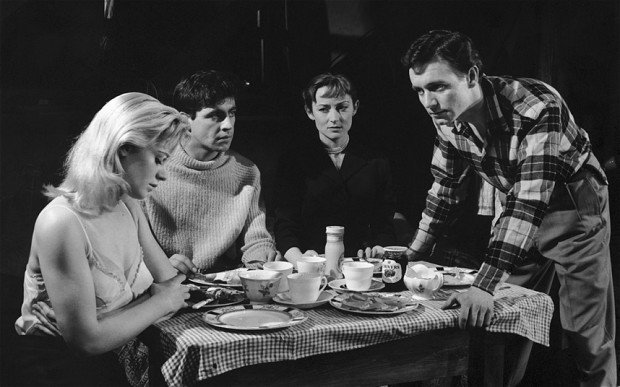
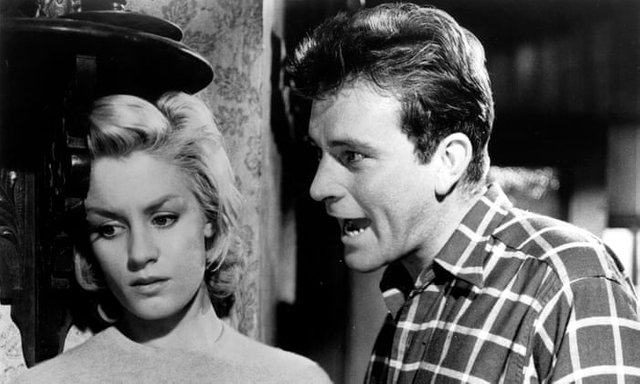
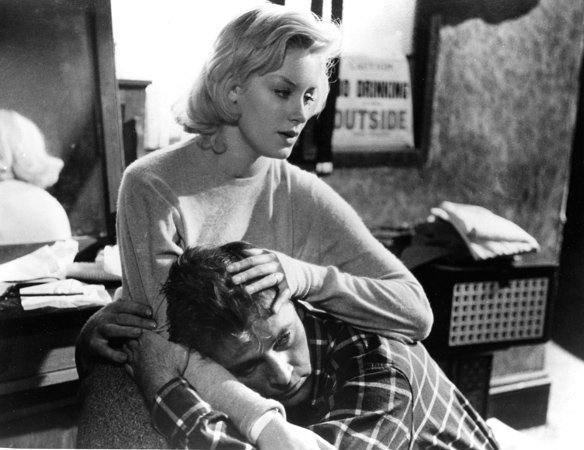
discussing way of character archetypes and also be basic story plots and famous literary figures such as JK Rowling and Ernest Hemingway and look back in the past #great . sir @adsactly your think #knowledge about presentation , discussing are great . i love your discuss .thank you #sir . i have to learn many things for a post uploading .
That's right, @honeydue. Unfortunately, theatre is not a literary genre that has been widely exploited. In fact, I remember that in my college career I saw very little theater. Throughout my life I have seen plays that have impressed me a lot. I've seen John Osborne looking back in anger and I thought it was great. The good thing about theatre is that you'll be able to see a different play each time, because every staging is different even if it's the same play, the same actors and the same director. I've enjoyed plays by Tennessee Williams, Arthur Miller, Berthold Brecht, Samuel Beckett, Cervantes, Calderón de la barca, Ionesco, Genet. One of the best is the piece Waiting for Godot, every time I've seen it I've enjoyed it. I really enjoy the theatre of the absurd. Thank you for this post.
Thank you, Nancy! Theater seems to be a dying thing, sadly...So we must make sure it doesn't die, you know?
Well, that's great to hear, because I plan to feature most of them in this series, as they are some of my favorites as well! Indeed, there is nothing in the literary world that compares to Waiting for Godot. The sheer madness of it is...incredible, still. As is Ionesco's writing, it's utterly mad and absurd, but it carries a very interesting, subtle message :) So, hope you like the next posts in the series too!
Thank you for commenting!
Very good initiative, @honeydue. Truly the theater until now had been a great absent on this blog. With your series I'm sure you'll be able to give it the recognition it deserves. Already with your first post you give us a very good sample. The playwright and his work, which you so appropriately present to us, allows us to get closer to a little-known playwright, although there is a film version of the work you are working on.
All the conflicts are fully valid. The human being in his relationships with his partner and friends continues to confront the same problems, and his inner conflict -of intemperance and anger- has worsened in these dark times. Thank you and greetings.
Thank you! :) Yes, I think the message and conflict of Look Back in Anger is as true now as it was sixty years ago.
It's a bit weird writing about theater, especially having to explain the whole play in brief, while also conveying the complexity of the text, but I will try, as it's a subject that fascinates me.
Thank you for your comment!
The story of the lives of human children who face sadness certainly becomes interesting when revealed. Seeing this performance we will be invited to go back to the past. Starting from childhood, adolescence to adulthood. All of that becomes a mirror for us to be able to take valuable lessons. Loneliness, suffering and misfortune can we take the lesson. Especially when knowing, even if only from entertainment, we can wisely take moral values and lessons. And even you also write the story of writing this play. The bitter story of divorce experienced. Certainly not a pleasant story, but we can learn a lot from the story too.
Thank you @honeydue
Thank you @adsactly
Thank you Steemit
Warm regard from Indonesia
Wow. Love the write up.
I run Entertainment Company myself so I always like to research and learn new ways to become a better Performing Artist. :)
Key up the great posts.
Going to upvote and follow. :)
Posted using Partiko Android
Hi, @adsactly!
You just got a 0.32% upvote from SteemPlus!
To get higher upvotes, earn more SteemPlus Points (SPP). On your Steemit wallet, check your SPP balance and click on "How to earn SPP?" to find out all the ways to earn.
If you're not using SteemPlus yet, please check our last posts in here to see the many ways in which SteemPlus can improve your Steem experience on Steemit and Busy.